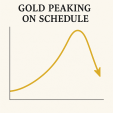Does The Gold Price Go On Vacation?
Does gold go on vacation? I don’t know, but I am going for sure. But before that happens, I encourage you to read another special edition of the Gold News Monitor from Auburn, Alabama.
Gold Always Pays Its Debts
In July, I promised you to review some of the books about gold which you can find in the enormous library at the Mises Institute located in Auburn, Alabama. Now, it’s time to fulfill my obligation. In the picture below, you can see part of the collection dedicated to gold. Of course, it’s not the whole set, but I didn’t manage to bring them all (too much time in the library, too little at the gym, I suppose), so I chose the most interesting ones.

In the Mises Institute’s library I found a few positions about the history of gold and its relations to empires, adventures and debt (see: War and Gold by Kwasi Kwarteng), or Gold about the history of gold mining (the author, Matthew Hard, described it as a story about the race for the world’s most seductive metal).
And I was really glad to finally find the paper edition of The Golden Constant by Roy W. Jastram. He carefully analyzed the historical gold prices in the UK and the U.S. He found that gold was a poor hedge against shorter-term inflation, but it maintained its purchasing power over long periods of time, for example, half-century intervals. The problem is that the time frame was 1560-1976, so it covers also periods were the price of gold was fixed (we have a free market for gold only since 1971).
Gold Standard
But most books refer to the gold standard: how it worked, why it should be a better monetary system that the current one, or why it was hated by the politicians (see: The War on Gold by Antony C. Sutton, in addition, of course, to the readings of Mises or Hayek). Some of the volumes also analyze the London Gold Pool and the collapse of the Bretton Woods system. It’s not surprising, as the libertarians and the Austrian economists are skeptical of the government and notice that the gold standard expressed the order of the free market system, or more generally that gold is money (see: Gold Is Money by Hans F. Sennholz) and it goes with freedom (see: Gold and Liberty by Richard M. Salsman).
However, if I had to choose only one book about the gold standard, I would recommend The Gold Standard. Perspectives in the Austrian School (ed. by Lew Rockwell), which offers several articles about the subject matter written by Austrian scholars. Another excellent, although quite long, book about the gold standard and, more generally, about the history of U.S. money and currency crises in the world is Gold: The Once and Future Money by Nathan Lewis.
Investing in Precious Metals: Reading Recommendations
Sure, the history of gold is great, but where’s the beef? What about a book on investing? Here you are, there is a lot of this stuff! For example, Donald J. Hoppe wrote How to Investing in Gold Stocks and Avoid the Pitfalls and How to Invest in Gold Coins. You can also read Trading in Gold by Paul Sarnoff. The author describes gold trading markets and strategies. He correctly notes (in 1980, while the WGC still does not understand this) that the supply/demand equation does not drive the price of gold. Instead, U.S. inflation is a rather important factor.
Precious Metals: A Guide to Trading and Investing by Anthony George Gero is another interesting book. The author has some great pieces of advice about interpreting the news. He writes that investors have to remember that it gets old very quickly, so once the markets have adjusted to a particular piece of news, they will no longer react. We see this ‘diminishing value’ syndrome all the time, the trade wars might be the best example. Gero also correctly warns against sensationalism. Investors have to discount the sensational aspect of the story and relate it to the reality of what is actually being traded.
You might also be interested in On Gold edited by H. Alan Lipscomb and Donald R. Libey. In our favorite chapter, Pamela and Mary Anne Aden refute, just as we often do, the popular myth that international tension or war alone results in higher gold prices. Instead, the important factor in understanding gold’s behavior is the economic cycle and the current position in the cycle. In particular, the gold price moves in tandem with inflation. And it is worth remembering that “debt fuels inflation; and inflation, or inflationary expectations, fuel the price of gold.”
The last but not least book is Gold Trading Boot Camp by Gregory T. Weldon. It’s a first-person war story from the front lines of trading. As we do, Weldon acknowledges: “From the macroperspective, what matters for precious metals is the Fed. As much as I hate to admit it, it all starts and ultimately will end with the Fed.” He also makes some interesting points about the psychological risk related to investing in gold. The key rule is that “the market is always right, even when it is wrong.” Weldon, of course, does not mean that there are no bubbles in the market. He rather warns against the ego of investors who think they know more than the marketplace. So investors have to accept the necessity of losing. In poker folding a losing hand can be the strongest move possible. Similarly, taking a loss can be the strongest move in trading.
Some Quotes Instead of Conclusions
Although I do not always agree with the entire content of the books on gold (the problem of some of these books is that there are sometimes quite old and outdated), I almost always find some interesting quotes. For example, in Gold: The Real Ruler of the World by Franklyn Hobbs, one can read that “gold is the Greatest Power in the World and probably the least understood,” while in The Great Gold Comeback by James R. Cook, one can find the following sentence: “The desire for gold is the most universal and deeply rooted commercial instinct of the human race.”
Or, let’s take Jastrom’s book:
Gold has two interesting properties: it is cherished and it is indestructible. It is never cast away and it never diminishes, except by outright loss. It can be melted down, but it never changes its chemistry or weight in the process. The ring worn today may contain particles mined in the time of the Pharaohs.
Last but definitely not least, in a book entitled Why Gold? the author, Leslie Snyder, quotes George Bernard Shaw who probably summarized the best the importance of gold serving as money:
The most important thing about money is to maintain its stability (…) You have to choose (as a voter) between trusting to the natural stability of gold, and the natural stability, and the honesty and intelligence of the members of the Government. And, with due respect to those gentleman, I advise you, as long as the Capitalistic system lasts, to vote for gold.
Enjoy your summer readings!
Arkadiusz Sieron
Sunshine Profits - Free Gold Analysis
* * * * *
All essays, research and information found above represent analyses and opinions of Przemyslaw Radomski, CFA and Sunshine Profits' associates only. As such, it may prove wrong and be a subject to change without notice. Opinions and analyses were based on data available to authors of respective essays at the time of writing. Although the information provided above is based on careful research and sources that are believed to be accurate, Przemyslaw Radomski, CFA and his associates do not guarantee the accuracy or thoroughness of the data or information reported. The opinions published above are neither an offer nor a recommendation to purchase or sell any securities. Mr. Radomski is not a Registered Securities Advisor. By reading Przemyslaw Radomski's, CFA reports you fully agree that he will not be held responsible or liable for any decisions you make regarding any information provided in these reports. Investing, trading and speculation in any financial markets may involve high risk of loss. Przemyslaw Radomski, CFA, Sunshine Profits' employees and affiliates as well as members of their families may have a short or long position in any securities, including those mentioned in any of the reports or essays, and may make additional purchases and/or sales of those securities without notice.


















